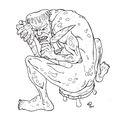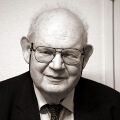Template:Selected anniversaries/October 14: Difference between revisions
From Gnomon Chronicles
No edit summary |
No edit summary |
||
| Line 34: | Line 34: | ||
File:J._R._Oppenheimer.jpg|link=J. R. Oppenheimer|1948: Musician and physicist [[J. R. Oppenheimer]] performs his hit song "Destroyer of Worlds" at the Grand Ole Opry, leading to his being summoned before the [[House Un-American Activities Committee (nonfiction)|House Un-American Activities Committee]]. | File:J._R._Oppenheimer.jpg|link=J. R. Oppenheimer|1948: Musician and physicist [[J. R. Oppenheimer]] performs his hit song "Destroyer of Worlds" at the Grand Ole Opry, leading to his being summoned before the [[House Un-American Activities Committee (nonfiction)|House Un-American Activities Committee]]. | ||
||1960 – Abram Ioffe, Russian physicist and academic (b. 1880) | ||1960 – Abram Ioffe, Russian physicist and academic (b. 1880) Abram Fedorovich (or Fyodorovich) Ioffe (Russian: Абра́м Фёдорович Ио́ффе; 29 October [O.S. 17 October] 1880 – 14 October 1960) was a prominent Russian/Soviet physicist. He received the Stalin Prize (1942), the Lenin Prize (1960) (posthumously), and the Hero of Socialist Labor (1955). Ioffe was an expert in electromagnetism, radiology, crystals, high-impact physics, thermoelectricity and photoelectricity. He established research laboratories for radioactivity, superconductivity, and nuclear physics | ||
||1962 – The Cuban Missile Crisis begins: A U.S. Air Force U-2 reconnaissance plane and its pilot flies over the island of Cuba and takes photographs of Soviet SS-4 Sandal missiles being installed and erected in Cuba. | ||1962 – The Cuban Missile Crisis begins: A U.S. Air Force U-2 reconnaissance plane and its pilot flies over the island of Cuba and takes photographs of Soviet SS-4 Sandal missiles being installed and erected in Cuba. | ||
Revision as of 13:29, 26 December 2017
1831: Astronomer Jean-Louis Pons dies. He was the greatest visual comet discoverer of all time: between 1801 and 1827, Pons discovered thirty-seven comets, more than any other person in history.
1881: Writer and alleged troll Culvert Origenes calls Extract of Radium "a plague on all living things, and a curse on civilization."
1884: Inventor George Eastman receives a U.S. Government patent on his new paper-strip photographic film.
1948: Musician and physicist J. R. Oppenheimer performs his hit song "Destroyer of Worlds" at the Grand Ole Opry, leading to his being summoned before the House Un-American Activities Committee.
2010: Mathematician Benoit Mandelbrot dies.





